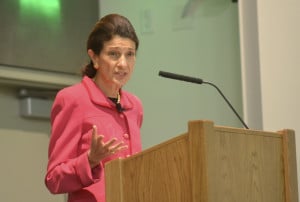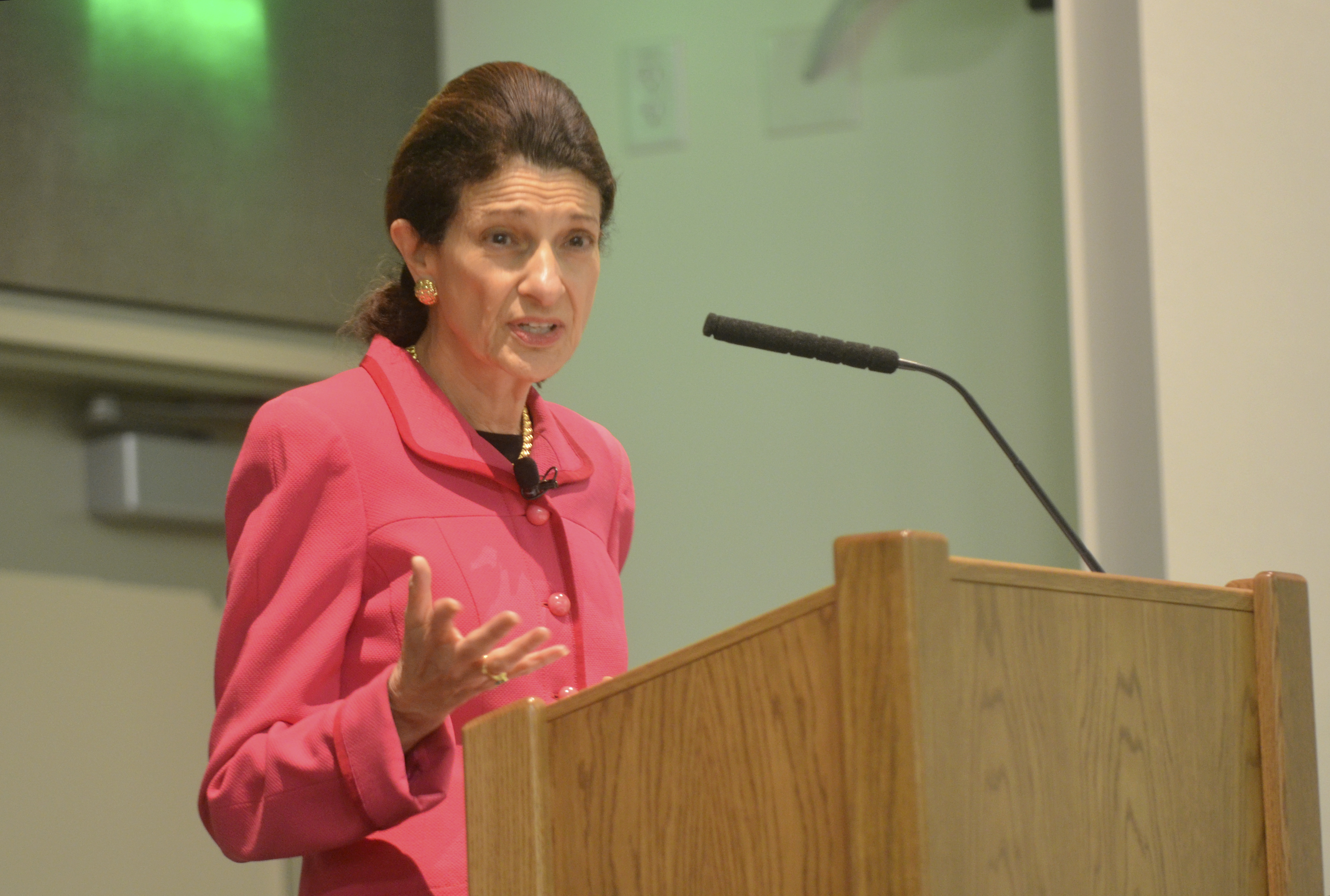Olympia Snowe, a former Republican U.S. Senator from Maine, visited campus on May 2 to deliver an address at the Stanford School of Medicine on the necessity of bipartisanship in Congressional politics. Snowe, who last fall decided to retire from a safe seat in the Senate after 24 years in Congress, spoke to students about women in politics, the future of the Republican Party and the failure of consensus-building in the nation’s senior legislative body. Prior to her speech, The Daily sat down with Snowe to get a greater grasp on her perspectives regarding these issues.

The Stanford Daily (TSD): Do you think President Obama has been an effective leader for Congress?
Olympia Snowe (OS): It’s interesting– I think he should have started a long time ago, but that doesn’t excuse today. I think that he should have worked more aggressively with Congress from the outset of his own presidency because that’s how it works. You can’t have the executive and legislative branches operating on parallel courses and never integrating.
I don’t think he exerted the strong leadership that is essential for these times and on some of these key matters, and of course you have people who weren’t responsible, including people in my party. I often think back when I look to 2009, when his presidency began, it seemed like the wheels came off so quickly between the Congress and the President in a time when it mattered so much for the country.
I was one of three Republicans to support the stimulus– not that I loved the stimulus, but] I also understood it was an imperative for the times because the economy was on the edge. [The stimulus] resuscitated [the economy] from collapsing entirely, but then you needed that injection in the private sector– you get the economy on its feet, and that’s the point.
And so now Obama has made overtures, which I think is important with Republicans… And I think he has to appreciate and understand the power of his office and how important it is for his for him to be that voice but to weigh in and make sure that he’s doing everything within the auspices of his authority to work with members of Congress.
TSD: What do you view as your greatest accomplishment in Congress? You were there for 24 years, so that’s quite a significant amount of time. Have you always been so passionate about bipartisanship?
OS: Well, absolutely, because I know now of no other way of accomplishing great achievements for this country and, certainly for those I represented in both the House and Senate, without working across the political aisle. I think it’s very essential and crucial to do all that we can do in maximizing the possibilities for America. Working with colleagues with whom you might disagree was critically important to reach that agreement.
Working through those differences is the bridge by which you can get the very best legislation. That was true of the greatest legislative achievements of the 20th century, whether it was Social Security, Medicare, the Voting Rights Act, the Civil Rights Act– they were all voted on a bipartisan basis and not along party lines, and that’s why it’s woven into the fabric of our country.
TSD: When you came to Congress in the late 1970s, was this issue of partisanship as big as it is today?
OS: Oh, no. You had your differences, and there were divisions, but it wasn’t to the exclusion of solving a problem. It wasn’t the impediment and the barrier for crafting solutions to the problem– you never thought that you couldn’t get there from here, as people say in Maine. And it was true.
It was natural that you would work out those differences, and the process by which to accomplish it is in the committees, which is where you were able to exercise your views through the amendment process. And then, of course, on the floor of the House, and that was true in the United States Senate, which is a more deliberate body because it’s smaller and it’s designed to focus and be more methodical in addressing the issues, so the process ordinarily would allow for that, but that’s not what’s happening today, regrettably so.
So much is transformed in the legislative landscape, let alone the political landscape, that has prevented the possibilities of reaching consensus on even the smallest issues, let alone the most significant ones facing us at this time.
TSD: Do you think that there are any specific groups or set of individuals who are most responsible for this lack of bipartisanship, especially in relation to the sequester?
OS: I mean certainly, it hasn’t been everybody, and I’ve said that, when I was there, that we each individually have a responsibility, and the same is true of my party in Congress, and the President and the Congress– they should have worked it out.
People depend on [federally-funded] programs, so you have to decide — you have to weigh the issues, what’s right and what’s wrong. And when people [are] losing their jobs or experience a furlough, cuts in their pay, because of these automatic cuts and the impact it’s going to have on our already subpar economy, Congress has to rise to the highest levels to respond. But that’s not what’s happening, and I think that’s what’s alarmed a lot of people.
You know, there are a lot of good people in Congress, there’s no question. Unfortunately, there’s this dysfunction that’s emanated from campaigns and policies of politics and so many other things. It’s just spilled over into this legislative process, but I think you’ve got to rise above and do what’s right for the country.
TSD: I read that you now back same-sex marriage. You voted for the 1996 Defense of Marriage Act. Can you please address this shift in opinion?
OS: Since that time, there’s been a major evolution and change. And I think that’s as it should be– it takes gradualism sometimes before you can act, you know, and bringing it to the public when the public has a better understanding builds greater support. Ultimately, I think you’re seeing what’s happening today across the country, including in my state of Maine, which had a referendum last year to approve same-sex marriage. It’s all part of the gradualism that is involved on some of these key societal questions. Sometimes they do take time, but it’s important for the country to come along on those questions as it has been evolving and developing. Ultimately, I’ve come to the same conclusion, and that’s why I made the decision that I did.
TSD: You recently launched a project called Olympia’s List in order to promote bipartisanship in government. Can you explain the list to me?
OS: I launched this, first of all, to create a sort of multi-candidate committee which will support candidates who are consensus-builders, who believe as I do that it is important to use the position of public office to craft solutions– to, you know, be consensus-builders and to maximize that potential. So I will support candidates who are willing to work across the political aisle and to hopefully build a national following through my Facebook and Twitter and website because I think it’s important to do, and it will be an extension of my new book coming out in two weeks, “Fighting for Common Ground.”
It’s all about how [bipartisanship] used to work in Congress, and how it can again. I’m a can-do person, and I just know that we can solve our problems if we are willing to work together. I want to demonstrate how it has worked in both the House and the Senate and what’s happening now and what we can do to change it.
This interview has been condensed and edited.
